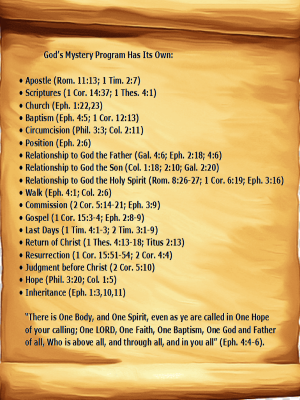op: "works salvation"?
"Works salvation" is a term that gets thown around a lot on forums as this one.
1) What is "works salvation"? How does one define "works salvation" according to the Bible?
2) What is an example from the Bible of "works salvation"?
3) Was Noah's work in building the ark "to the saving of his house" (Heb 11:7) a "works salvation"?
The issue I am raising is this; is obedience to God's will a work of merit, that is, does one earn salvation by obedience to God?
Fair enough question -
@Seabass? Sorry, I'm late

Are you there, still around?
Now that we have
nearly 1000 posts out of our systems, let's
prayerfully and
Carefully Examine God's Word,
Rightly Divided [
only 29 posts
*], shall we?:
Paul says that we are ‘freely’ justified (Rom. 3:24), and later he describes salvation as a ‘free gift’ (Rom. 6:23). But some claim that we must ‘do’ something, such as be baptized, in order to be saved. I've seen this one turn into a big argument and I don't believe baptism is a requirement for salvation.
Precious friend, thank you -
key words?
Why would God "Want
us to
Pay Attention to
His Words:
"in Paul's 'Inspired Of God' letters"? Paul says Twice: "What Saith The Scriptures?":
"By Grace Through faith" (Eph 2:8-9)
For God's Eternal Salvation, Today, simply means?:
God's ↑ Part ....... our ↑ part,
Confirmed by
All The Plain And Clear Scriptures That Christ
Revealed [ In
The Mystery (Rom 16:25; 1Co 2:7; Eph 1:9, 3:3, 4, 9, 6:19; Col 1:26) ] To Paul?:
1) "Therefore we conclude that a man Is Justified By faith Without the
deeds of the law." (Rom 3:28, 5:1 cp Gal 2:16, 3:11, 24)
2) "For By Grace are ye saved through faith; and that not of yourselves:
It Is The [ Free ] Gift Of God: Not of works, lest any man should boast."
(Eph 2:8-9 cp Rom 3:24: "Justified Freely By His Grace")
3) "Not by works of righteousness which we have done, But According to
His Mercy He Saved us, By The Washing of Regeneration, and Renewing
of The Holy Ghost; Which He Shed on us Abundantly Through Jesus Christ
our Saviour; That Being Justified By His Grace, we should be made heirs
according to the hope of eternal life." (Tit 3:5-7 cp )
Results of God's Grace, Mercy, and Love when we "trust, believe, and have 100%
faith"
In Him, His Death, Burial, and Resurrection, According To The Scriptures
(1 Corinthians 15:3-4; Ephesians 1:12-14; 1Timothy 1:14-16):
"To The Praise Of The Glory Of His Grace, Wherein He Hath Made us
Accepted In The Beloved. In Whom we Have Redemption Through His
Blood, The Forgiveness of sins, According To The Riches Of His Grace"
(Eph 1:6-7)
All According To
The Previously "Hid In God" Revelation Of The Mystery,
(Rom 16:25; 1Co 2:7; Eph 1:9, 3:3, 4, 9, 6:19; Col 1:26) to Paul, To The ONE Body
Of Christ, with ONE and
Only ONE [ Spiritual ] Baptism,
Which S
hould Be...:
Rightly Divided (
2 Timothy 2:15) From “Things That
Differ!” (
online):
...and
Not Ever mixed up [ in
Confusion ] with prophecy / covenants / law to
Twelve apostles, For
Twelve tribes of Israel, with "water baptism
For The
Remission of their sins!" with
all these "faith PLUS works"
Commandments:
1) Repent (change mind about sin/agree With God "it is Wrong!") or perish
(Luke 13:3,5, 24:47 Mark 1:4)
+
2) believe the gospel of the kingdom (Matthew 4:23, 9:35, 24:14; Mark 1:14,15)
+
3)
be water baptized "For the remission of sin" (Mark 1:4 Luke 3:3,
7:29:30, 24:47;
Act 2:38)
+
4) "show works meet for repentance" (Matthew 3:8), because,
+
5) "to the twelve tribes of Israel," "faith Without works is dead"
(James 1:1, 2:17, 20, 26)
+
6) "keep the commandments" to "enter life" (Matthew 19:17)
+
7) "one thing thou lackest...sell All / take up cross / follow Jesus"
(Mark 10:17-23)
---------------------------------------------
Again, it must be asked: the seemingly
Unanswerable [ no one will
touch ] question:
Which am I supposed to follow?:
A) Do I follow Christ, and the doctrine He Spoke as The:
Humble Christ, on the earth, To Israel, 12 apostles, Under The Law/covenants
/Prophecy:
or:
B) Do I follow Him As The Risen And Glorified "Head Of His Church" and ask:
I have decided to Follow ( The Heavenly ) Risen and Glorified LORD Jesus, in
His "Revelation Of The Mystery/Grace" To Paul?
Or:
C) Do I speak after following the Many, who homogenize A) + B) into
Massive Confusion? *
Amen.
* Seems to me that
homogenization /
textual criticism resulting in [ "Big Argument" ]
Confusion, of God's Word Of Truth is
3,000% [ almost 1000 posts]
More preferable than
The
"Simplicity Of Christ" 'Right Division' [29 posts] Of It, eh?
May
The Gracious and Merciful Lord Of Glory Help us All! Amen?:
-----------------------------------------

And AMEN!
